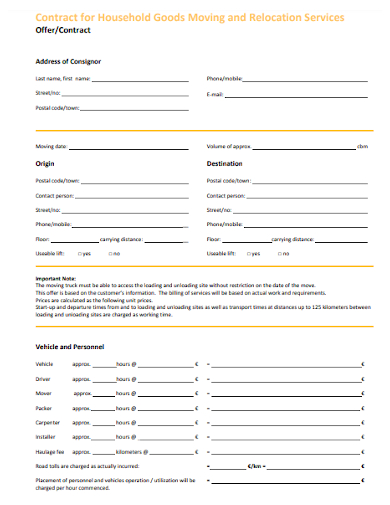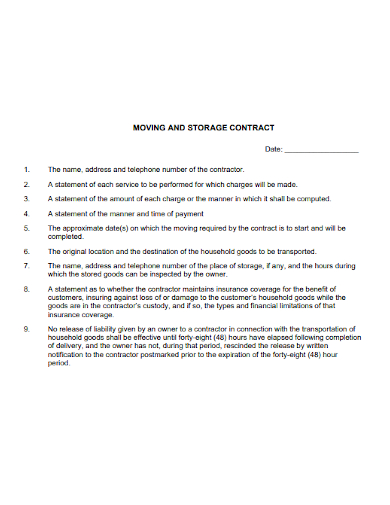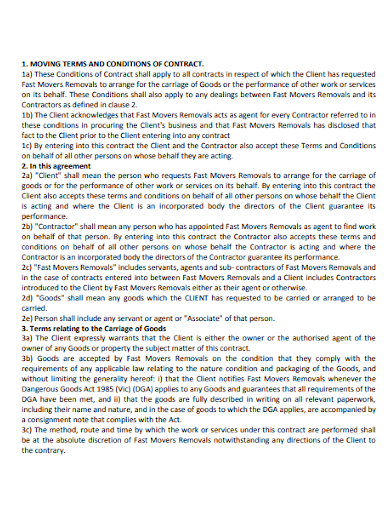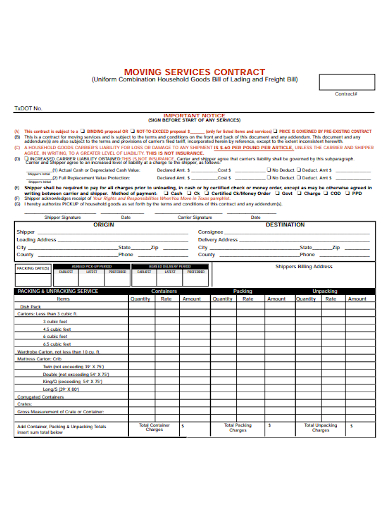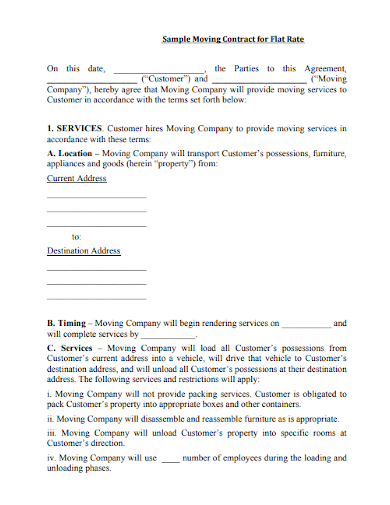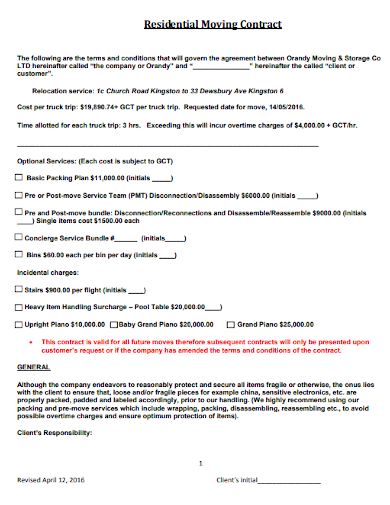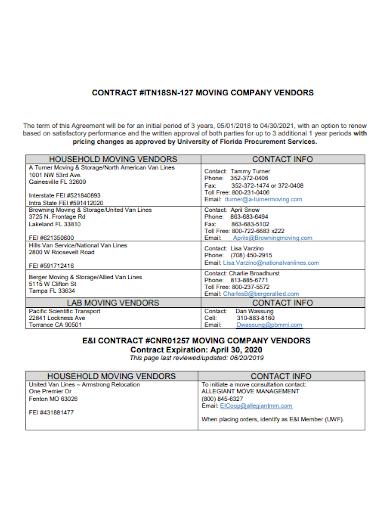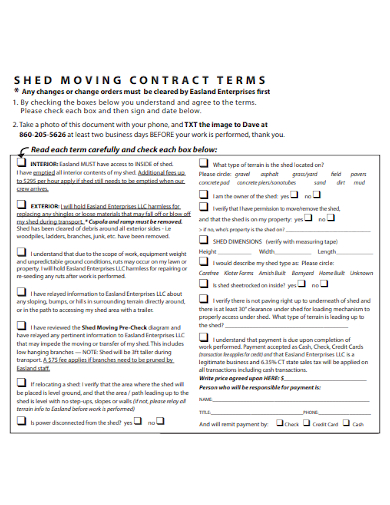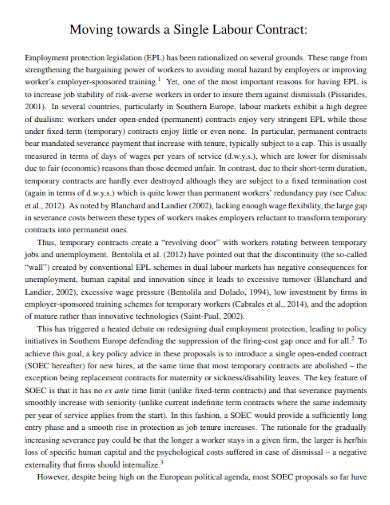With your relocation to a new house, hiring a professional moving company can save you a lot of time and stress. We’ve covered a lot of ground on how to choose your movers, including what to look for in a moving company and the five key questions to ask before hiring one. Any moving company you employ should be licensed, insured, and have a good reputation, as well as offer you a solid moving contract. A moving contract establishes the terms of the relocation procedure and protects you against moving fraud. It can help you and the movers stay on the same page about your move and protect you in the event of a disagreement. To maximize your chances of a safe and smooth transfer, make sure your moving contract is comprehensive and precise.
10+ Moving Contract Samples
A moving contract, also known as an order for service, is a document that outlines the terms and circumstances of your relocation. Both parties agree to certain specifics that dictate the moving service that will be performed by putting everything on paper and requesting signatures. A moving contract is provided by all reputable professional moving companies to their customers.
1. Moving Contract Template

2. Moving Company Contract Template
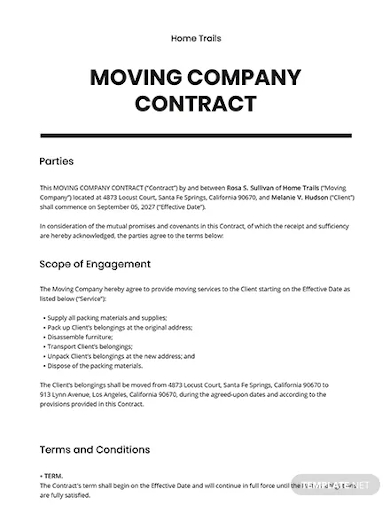
3. Moving Household Goods & Relocation Service Contract
4. Moving and Storage Contract
5. Moving Carriage of Goods Condition Contract
6. Moving Service Contract
7. Sample Moving Contract for Flate Rate
8. Residential Moving Contract
9. Moving Company Vendor Contract
10. Shed Moving Contract Terms
11. Moving towards a Single Labour Contract
It’s critical to be aware of frequent moving words that may appear in your contract. Although moving firms deal with contracts on a daily basis, it’s understandable if you don’t know the difference between full-value replacement and released-value replacement, or the various sorts of moving estimates.
If you don’t understand the jargon used by moving companies, you can end up accepting a contract that doesn’t match your needs or costs more than you anticipated. If your items are damaged in transit, for example, your contract may provide a refund that is less than you expect. You may also neglect to properly notify the moving firm about valuable items in your possession.
Getting a Moving Contract
- Moving estimate – The first document you’ll receive from a moving firm is an estimate of your moving fees. In general, there are two types of moving estimates: binding (which guarantees the cost of your move unless you add more weight to your shipment or request additional moving services) and non-binding (which does not guarantee the cost of your move unless you add more weight to your shipment or request additional moving services) (that is susceptible to change, depending on the actual weight of your items and specific services provided by your mover). Request an on-site visual examination of your home and a signed binding not-to-exceed quotation to determine the exact cost of your move. Accept no online or over-the-phone estimates; they will never be correct. Also, be wary if you receive an estimate that is significantly lower than the others; lowball estimates are a strong signal of moving fraud.
- Bill of lading – The Bill of Lading is a contract between you and the moving business you’ve hired; it’s created from the order of service and should exactly match it. On moving day, the movers must provide you with the Bill of Lading, which you must sign before they can begin working. Before signing your moving contract, carefully read the agreement to ensure that all of the specifics of your relocation are correctly and clearly stated and that you understand and agree with all of the stipulations.
- Inventory list – When the movers arrive, the first thing they’ll do is do a walk-through of your home and create a written inventory of the items you’ll be transferring. Make sure the inventory list includes all of the objects you’ll be entrusting to the movers and that their condition is accurately documented (so you have proof of the pre-move condition of your belongings in case you need to file a damage claim against your movers).
FAQs
What are the inclusions in a bill of lading?
- Contact information for the moving firm, as well as information on licensing and insurance;
information about yourself; - The shipment’s origin and destination addresses;
- Dates (or time periods) for pick-up and delivery;
- The identification number(s) of the moving vehicle(s) that will transport your cargo;
- The moving services that are required, as well as their costs;
- The total cost and the payment method;
- Information on resolving disputes;
- Addendum to the valuation
What are assessing costs?
These are the costs that can be included in a moving estimate to determine how much you’ll have to pay. Additional charges, advanced charges, replacement coverage, and line haul charges are some of the most frequent assessment expenses.
Take all effort to ensure that you get exactly what you want, and don’t sign the contract until you’re sure everything is as you expected. The more cautious you are, the easier your transition will be.
Related Posts
Sample Excuse Letter for School
Feature Writing Samples
FREE 10+ Security Guard Contract Samples in PDF | MS Word
FREE 10+ Option to Purchase Agreement Samples in MS Word | Apple Pages | PDF
FREE 26+ Curriculum Form Samples in MS Word | PDF
FREE 20+ Cleaning Service Proposal Samples in PDF | MS Word
FREE 29+ Sample Loan Application Form Templates in MS Word | PDF
FREE 10+ Event Venue Contract Samples in PDF | MS Word | Pages | Google Docs
FREE 10+ SBAR Samples in PDF | DOC
FREE 12+ Music Band Contract Templates in PDF | MS Word
FREE 10+ HVAC Maintenance Contract Samples in PDF | MS Word
FREE 10+ Social Media Marketing Contract Samples in MS Word | PDF
FREE 10+ Wholesale Assignment Contract Samples in PDF
FREE 18+ Financial Proposal Samples in PDF | MS Word | Google Docs | Pages
FREE 10+ Feasibility Study Samples in PDF

